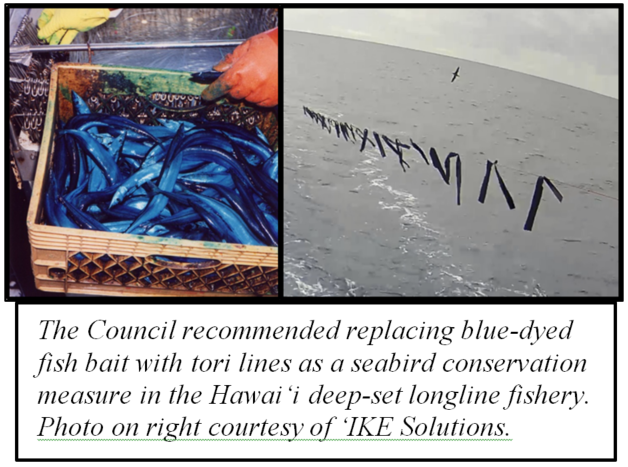News and Announcements
Press Release – Western Pacific Scientists Support Tori Lines Over Blue-Dyed Bait in Tuna Fishery and Exploring New Bottomfish Management Approach (30 November 2021)
 HONOLULU (30 November 2021) The Scientific and Statistical Committee (SSC) of the Western Pacific Regional Fishery Management Council continued to support replacing blue-dyed fish bait and strategic offal discard requirements in the Hawai‘i deep-set longline fishery with tori lines for seabird bycatch mitigation. Results from field experiments conducted in the past three years under an experimental fishing permit showed that Laysan and black-footed albatross were 4 times less likely to come in contact with baited hooks when participating vessels used tori lines, or bird scaring lines, versus blue-dyed bait. Tori lines have proved effective in other longline fisheries around the world.
HONOLULU (30 November 2021) The Scientific and Statistical Committee (SSC) of the Western Pacific Regional Fishery Management Council continued to support replacing blue-dyed fish bait and strategic offal discard requirements in the Hawai‘i deep-set longline fishery with tori lines for seabird bycatch mitigation. Results from field experiments conducted in the past three years under an experimental fishing permit showed that Laysan and black-footed albatross were 4 times less likely to come in contact with baited hooks when participating vessels used tori lines, or bird scaring lines, versus blue-dyed bait. Tori lines have proved effective in other longline fisheries around the world.
SSC members discussed various impacts the management alternatives could have on the U.S. longline commercial fishery, including additional crew time required to create and clean up the blue-dyed bait. The SSC supports removal of strategic offal discharge as a requirement since there is inconclusive scientific evidence that it provides a conservation benefit, especially in light of the tori line effect on seabird interaction rates. In lieu of this requirement, the management measure would include best practice training for longline vessel owners and operators on offal management at the required annual National Marine Fisheries Service protected species workshop.
The SSC provides scientific advice to the Council, which is considering modifications to a regulatory amendment to improve seabird conservation. The Hawai‘i deep-set longline fishery, which targets bigeye tuna, has been using a suite of seabird mitigation measures since 2001 under the Council’s Pelagic Fishery Ecosystem Plan.
After reviewing a workshop report on American Samoa bottomfish data evaluation, the SSC supported a single-species management approach for the next stock assessment scheduled for 2023. The American Samoa bottomfish fishery is managed in an 11-species complex, which is overfished and experiencing overfishing, according to a 2019 Pacific Islands Fisheries Science Center (PIFSC) assessment. The PIFSC Stock Assessment Program reported there are sufficient data to explore the use of single-species assessments for most managed bottomfish species except for pink snapper (palu-‘ena‘ena, Pristipomoides filamentosus).
The report summarized information collected from six systems and highlighted the data quantity, quality and changes over time. The catch per unit effort data from the creel surveys and the resulting estimated catch are highly uncertain, particularly for species that are not well represented in the surveys. However, there is sufficient information for a single species, age-based assessment using length information from the PIFSC diver surveys and biosampling program, and territory boat-based creel surveys.
Creel surveys collect general fisheries data provided voluntarily by commercial and noncommercial boat and shore fishermen. Moving forward with a single-species approach may require changes in conservation and management measures.
The SSC meeting continues tomorrow with discussions on pelagic and international fisheries. Instructions on connecting to the web conference, agenda and briefing documents are posted at www.wpcouncil.org/event/142nd-scientific-and-statistical-committee-virtual-meeting.
Scientific and Statistical Committee: James Lynch (Sierra Pacific Industries) (chair); Debra Cabrera (University of Guam); Frank Camacho (University of Guam); Milani Chaloupka (University of Queensland); Erik Franklin (University of Hawai‘i, School of Ocean and Earth Science and Technology); Jay Gutierrez (Guam Division of Aquatic and Wildlife Resources); Shelton Harley (Fisheries New Zealand); Jason Helyer (Hawai‘i Division of Aquatic Resources); Ray Hilborn (University of Washington); Justin Hospital (National Marine Fisheries Service (NMFS) PIFSC); David Itano (fisheries consultant); Donald Kobayashi (NMFS PIFSC); Steve Martell (SeaState, Inc.); Domingo Ochavillo (American Samoa Department of Marine and Wildlife Resources); Graham Pilling (Secretariat of the Pacific Community); Kurt Schaefer (Inter-American Tropical Tuna Commission); Craig Severance (University of Hawai‘i at Hilo, retired); Michael Tenorio (CNMI Division of Fish and Wildlife); and Michael Seki (ex-officio) (NMFS PIFSC).
